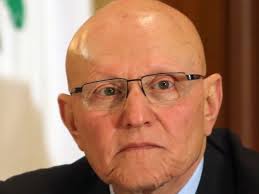 Prime Minister-designate Tammam Salam stressed on Sunday during an interview with BBC on Sunday that resistance against Israel is legitimate, but stressed that “the decisions of war and peace must rest in the hands of the Lebanese state.”
Prime Minister-designate Tammam Salam stressed on Sunday during an interview with BBC on Sunday that resistance against Israel is legitimate, but stressed that “the decisions of war and peace must rest in the hands of the Lebanese state.”
Salam revealed to BBC that the Iranian Ambassador to Lebanon Ghazanfar Roknabadi relayed to him a message from Iran’s leadership on Sunday, in which Tehran “wished him success in forming a new cabinet and stressed its keenness on the resistance.”
Asked whether Iran had linked facilitating his mission to keenness on Hezbollah, Salam said “everyone knows Iran’s stance.”
“Resistance against Israel is legitimate, but the decisions of war and peace must rest in the hands of the Lebanese state and we must put an end to the use of arms in the domestic arena,” the PM-designate stressed
Asked whether he was surprised by receiving an Iranian message although he is “the candidate of the March 14 forces,” Salam said: “Today, I’m a prime minister-designate and I communicate with everyone. I have also received a letter of support from Russia, which was carried by the Russian ambassador.”
Salam denied being contacted by Syrian Ambassador to Lebanon Ali Abdul Karim Ali.
He noted that “there is international and regional consensus on helping Lebanon during this period,” revealing that “regional and international influences were behind the consensus” on naming him.
“I hope this consensus will also apply to the process of forming the cabinet, whose mission must be limited to holding the elections,” Salam added.
Salam admitted that his mission is not easy, calling on all political forces to “realize the graveness of this critical period amid the developments in Syria and the region, which require us to close ranks.”
The PM-designate declined to discuss the shape and size of his cabinet, saying he was awaiting the outcome of his consultations with the parliamentary blocs that will be held next week.
In another interview with AFP on Saturday, Salam, was diplomatic when asked about Hezbollah’s arsenal of weapons, long a subject of discord between the rival March 8 and March 14 camps.
“I am with the resistance when it is pointed in the right direction and when it is a matter of defending Lebanon,” Salam said.
But “when that arsenal is turned toward the inside of the country for the purpose of influencing the (political) balance, that is straying from the resistance,” he added.
Salam was appointed PM-designate on Saturday after 124 out of 128 MPs nominated him during two days of consultations with President Michel Suleiman at the Baabda Palace.
In another interview with Al-Arabiya television later on Sunday, Salam said: “Whatever the shape of the new cabinet might be, it will be a cabinet for holding the elections.”
“The March 8 forces went through arduous negotiations before deciding to nominate me, so we must build on this positive result,” he added.
Asked about the so-called policy of self-dissociation adopted by Najib Miqati’s government toward the Syrian crisis, Salam said: “The policy of self-dissociation in the face of the Syrian crisis is good but it should be implemented in a proper manner and we are seeking to steer Lebanon away from dangers.”
On his relation with Saudi Arabia, Salam said: “I’m not away from the Kingdom of Saudi Arabia and its historic role in Lebanon.”
In another interview on MTV, Salam said “each camp has the right to suggest the type of cabinet it wants, but we must agree on a common vision.”
Tammam Salam on Saturday became Lebanon’s premier-designate after receiving 124 votes in the two-day parliamentary consultations as Lebanon’s parties began looking ahead to government formation.
Salam is the son of six-time former PM Saeb Salam and has himself served as culture minister in Fouad Siniora’s cabinet between 2008 and 2009.
He won a seat in parliament in 2009 while running on March 14’s electoral list in the Beirut III district.

Leave a Reply
You must be logged in to post a comment.